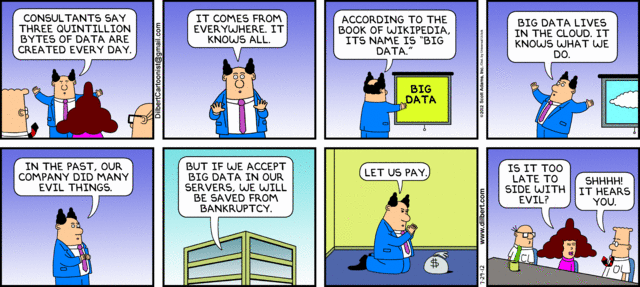You may soon get a call from your doctor if you’ve let your gym membership lapse, made a habit of picking up candy bars at the check-out counter or begin shopping at plus-sized stores.Karl's point is about how data mining companies are extracting the information we voluntarily give the stores we shop at and determining how best to sell the data; in this case, to hospitals and doctors' groups. Things like your Cabela's Club, BassPro Rewards or other loyalty/bonus cards that pay you for shopping someplace collect more than just your name and address; they collect your shopping history. This goes for grocery stores and any others where you pay by debit or credit card. This information is up for sale. As Denninger says:
That’s because some hospitals are starting to use detailed consumer data to create profiles on current and potential patients to identify those most likely to get sick, so the hospitals can intervene before they do.
It would be nice to believe that this is all a matter of consensual conduct but it is not; there is effectively nowhere you can shop, other than by strictly using cash (and probably not even then given the prevalence of cameras at the checkstand) without having your identity indelibly stamped on every single thing you buy.Back in the '80s, I read a book about this trend when it was first starting. The author and his wife had just learned that they were expecting their first child, and he was shocked to get email attempting to sell him them a diaper service. He wondered how they knew such private information, that was literally known only to the couple, their doctor's office, and one or two others. Pulling on this loose thread led him down the path to how check-cashing cards (remember them?) allowed grocery stores to track your purchases. It's easier today, with UPC codes on everything, those codes linked to you by your debit card. From there, he went to "ZIP code demographics"; certain ZIP codes in his city were higher in young families likely to be having children, other codes higher in older couples. (Example of what a little outlay can tell companies).
The medical angle that the Bloomberg article takes goes beyond this to creepy - if anything, it goes to the heart of the nanny state drive of the nasty little fascist (Michael Bloomberg) himself.
For a patient with asthma, the hospital would be able to score how likely they are to arrive at the emergency room by looking at whether they’ve refilled their asthma medication at the pharmacy, been buying cigarettes at the grocery store and live in an area with a high pollen count, Dulin said.Sounds all wonderful and cheery, right? They just want to help; they just want to "drill down to the individual ... to find someone running into trouble...." In reality, their motivation is not to be fined. Under Obamacare, "hospital pay is becoming increasingly linked to quality metrics rather than the traditional fee-for-service model where hospitals were paid based on their numbers of tests or procedures." Hospitals that have too many patients readmitted within a month are now being fined by the government. So they'll call you into the office, prescribe more pills (which they can monitor refills of to ensure you're taking them) or send you to health camp, so that lots of interests can milk you for more money all the while doing things to you that don't necessarily help you (remember: your "cardio" workout may be killing you).
The system may also score the probability of someone having a heart attack by considering factors such as the type of foods they buy and if they have a gym membership, he said.
“What we are looking to find are people before they end up in trouble,” said Dulin, who is also a practicing physician. “The idea is to use big data and predictive models to think about population health and drill down to the individual levels to find someone running into trouble that we can reach out to and try to help out.”
It wouldn't be so bad if they really could predict who needed some help, not just who could contribute some funding. As I've said before, my personal view on "wellness" is that it's a fine thing, but most of what's thought to be true probably isn't. The lab numbers they keep telling us we should all meet are more likely to simply mean "young and healthy" than reflect a healthy older adult. How many times do studies which show that overweight people live longer and appear healthier need to be published before they stop being called "paradoxical".
Study after study has shown that obese heart patients have better survival and have fewer strokes and heart attacks than normal-weight or underweight heart patients with the same severity of disease, says cardiologist Carl J. Lavie, MD, of the Ochsner Medical Center in New Orleans.To borrow a conclusion from Denninger,
You are being screwed by this association already. You will get screwed much more-severely in coming years.

I consider it my obligation to lie to the information collectors. When they ask me at checkout what my zip code is I used to tell them none of their business, but I found it was more fun to tell them it is 90210. I never use my credit card to buy anything at stores and I have never written a check for a retail purchase in my entire 70 years. I always use cash. I do enjoy the political calls near election time when I get to tweak the callers. I have had pollsters hang up on me in disgust.
ReplyDelete